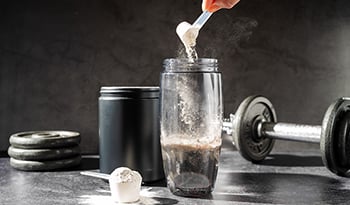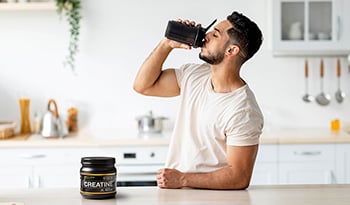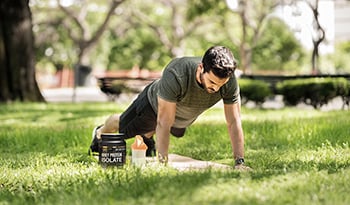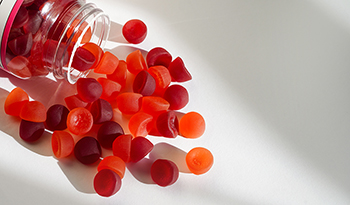The 10 Best Supplements to Support an At-Home Workout

Exercise promotes health and can support a longer life. The most evident benefits are in the cardiorespiratory, musculoskeletal, and body composition and metabolism. It also can help to balance mood and relax your nervous system.
Increasing exercise can also balance abdominal fat, support weight control, maintain healthy lipid and sugar levels, and boost blood flow and cognitive function. Heightened cognitive function has been associated with a healthy release of neurotrophic factors, which may support memory abilities.
Reduction of reactive oxygen species (ROS) has been attributed to supporting health. Exercise can induce the enzyme that supports the metabolism of these damaging molecules. It has been said that exercise actually acts as an antioxidant, keeping ROS low.
Physical exercise can also support healthy bones. Weight-bearing exercises like walking or running help support healthy cardiorespiratory systems. Exercise called multicomponent exercise—like aerobics, strength training, and dancing—are ideal for supporting osteoclastic or bone-building activity.
A relatively new concept called autophagy is the innate ability to break down and recycle aging or used-up material in the body. This process has been attributed to keeping systems in the body healthy and has been touted as an anti-aging function. Autophagy can be induced by exercise and may provide extra support for a healthy cardiovascular system.
Another unique feature of exercise is around the blood-brain barrier (BBB). The BBB provides physical protection for the brain and can be manipulated to work better through exercise. Exercise can reduce the permeability of this important structure, supporting healthy inflammatory levels and reducing ROS.
Cortisol, or our stress hormone, has many deleterious effects on the body, including the promotion of damaging inflammatory markers, induction of ROS, and weight gain. With moderate exercise, circulating cortisol levels have shown a significant reduction. Perception of stress and anxiety can also decrease with moderate exercise.
Exercise also plays a significant role in supporting a healthy metabolism. Depending on the type, exercise can support healthy sugar metabolism, by inducing hormones key in carbohydrate metabolism. This creates greater efficiency in the breakdown process and the release of essential energy production in the form of ATP.
Negative Effects Of Inactivity
Inactivity can start as early as childhood. Often, parents, family, or friends' habits set the tone of how important or unimportant exercise is in an individuals’ life and routine.
Just like the body adapts to exercise and enjoys the many benefits listed above, the body just as easily maladapts to lack of exercise. Often, an individual can succumb to a poorer quality of life or a shorter lifespan.
Often, a lack of exercise can negatively affect our body's chemistry, inducing damaging inflammatory reactions, increasing ROS, and/or supporting an inefficient metabolism, leading to weight gain or other unwanted side effects.
Lifestyle Adjustments To Support A Healthy Exercise Routine
Research has supported health care providers in encouraging their clients to engage in strategies to support a healthy exercise routine. Just as it’s routine to take blood pressure, weight, providers favor evaluating the amount of exercise someone engages in as a vital sign.
Setting a standard of 150 minutes per week of exercise may also help provide structure to a routine. Engaging in environments that set you up for success can also be helpful. Choosing friend groups who like to exercise, taking a job that has a budget to subsidize a gym membership, or choosing a place of worship with a workout class can help you commit to those routines. Communicating best practices around working out among healthcare providers may also help encourage others to follow them.
Supplements To Support An At-Home Workout
Many supplements can support a workout process, including B vitamins, protein supplements (both whey and plant-based protein), branched-chain amino acids (BCAAs), magnesium, citrulline, fish oil, vitamin D, creatine, caffeine, and choline.
1. B Vitamins
B vitamins are a family of water-soluble vitamins that act as cofactors, or needed elements, to many chemical reactions in the body. Many of the B vitamins are needed for the mitochondria to make energy. Others, like B6, support healthy levels of neurotransmitter production, leading to conservation of energy.
B vitamins have also been theorized to help protect against ROS, keeping our mitochondria healthy. As we exercise, the need for B vitamins increases as we are constantly metabolizing carbohydrates and other macronutrients for energy to power our bodies through exercise. This is especially true of riboflavin and vitamin B6.
2. Protein Supplements
Protein supplements are key for improving body composition, coupled with exercise. Plant-based protein supplements can come in many forms, including pea, hemp, or other legume proteins. This protein is ideal for anyone with dairy sensitivities or someone who follows a vegan diet. Whey protein is derived from milk and is a natural inducer of the antioxidant glutathione, working to combat damaging ROS.
Studies have compared the efficacy of both proteins head-to-head post-exercise and have found similar outcomes in muscle thickness and body composition between the two types of proteins.
3. BCAAs
BCAAs, or Branched-Chain Amino Acids, are small proteins that have a particular chemical structure. These amino acids are considered essential since the body cannot produce them on its own, and they must come from a dietary source.
The catabolism or breakdown of BCAAs is known to increase during exercise, so their consumption becomes even more essential. Consuming BCAAs before and after a workout has been shown to help avoid exercise-induced muscle damage and promote muscle synthesis.
4. Magnesium
Magnesium has over 300 jobs in the human body. This abundant mineral supports energy transport through the mitochondria by acting as a counter ion or way to balance what comes in and out of this energy-producing organelle.
Magnesium is key in supplying oxygen and energy production in muscle tissue. It is a necessary supplement, especially post-exercise, as it’s often used up quickly in workouts.
5. Citrulline
Citrulline is an amino acid that can be made by the body or consumed through foods like watermelon. This compound plays a key role in energy production in the cell.
The amino acid helps to produce molecules that can be used directly for energy in the mitochondria. Some studies have shown that supplementation with citrulline can support bringing more oxygen to muscle tissue during exercise, improving exercise performance.
6. Fish Oil
Fish oil is a key source of omega 3 fatty acids that naturally support a healthy inflammatory response. These fats can support a healthy respiratory system during exercise, promoting efficiency with this system.
Fish oil can also help to support exercise performance and may also support and reduce muscle soreness post-exercise.
7. Vitamin D
Vitamin D is a key nutrient needed for energy production. It is naturally made in the body through our skin’s contact with UV light. With indoor living and avoiding the sun being popular practices in the modern world, many are deficient in these essential vitamins.
Vitamin D plays a key role in breaking down our food for energy or energy metabolism. It can specifically support healthy sugar breakdown, theoretically supporting a healthy inflammatory response in the body.
8. Creatine
Creatine is a well-known supplement correlated with improved exercise performance. This compound, when ingested, added intramuscular creatine levels, which can elevate exercise performance and potentially reduce the severity of an injury.
9. Caffeine
Caffeine is often used as a pre-workout to enhance the energy available for muscle contraction. Caffeine has been shown to bolster speed and power in exercise output. This compound has also been attributed to enhanced endurance and resistance to fatigue.
10. Choline
Choline levels have been theorized to be depleted with high-intensity exercise. Research has shown that oral supplementation with this key mineral could be helpful to replete this lost nutrient.
Improve Your Workout Routine
Exercise is good for our bodies. It enhances energy, expands metabolic processes that support lean muscle, and reduces stress hormones. Take advantage of these 10 supplements to help support your workout routine.
References:
- Vina J, Sanchis-Gomar F, Martinez-Bello V, Gomez-Cabrera MC. Exercise acts as a drug; the pharmacological benefits of exercise. Br J Pharmacol. 2012;167(1):1-12. doi:10.1111/j.1476-5381.2012.01970.x
- Benedetti MG, Furlini G, Zati A, Letizia Mauro G. The Effectiveness of Physical Exercise on Bone Density in Osteoporotic Patients. Biomed Res Int. 2018;2018:4840531. Published 2018 Dec 23. doi:10.1155/2018/4840531
- Wu NN, Tian H, Chen P, Wang D, Ren J, Zhang Y. Physical Exercise and Selective Autophagy: Benefit and Risk on Cardiovascular Health. Cells. 2019;8(11):1436. Published 2019 Nov 14. doi:10.3390/cells8111436
- Małkiewicz MA, Szarmach A, Sabisz A, Cubała WJ, Szurowska E, Winklewski PJ. Blood-brain barrier permeability and physical exercise. J Neuroinflammation. 2019;16(1):15. Published 2019 Jan 24. doi:10.1186/s12974-019-1403-x
- Hill EE, Zack E, Battaglini C, Viru M, Viru A, Hackney AC. Exercise and circulating cortisol levels: the intensity threshold effect. J Endocrinol Invest. 2008;31(7):587-591. doi:10.1007/BF03345606
- Carreiro AL, Dhillon J, Gordon S, et al. The Macronutrients, Appetite, and Energy Intake. Annu Rev Nutr. 2016;36:73-103. doi:10.1146/annurev-nutr-121415-112624
- Moghetti P, Bacchi E, Brangani C, Donà S, Negri C. Metabolic Effects of Exercise. Front Horm Res. 2016;47:44-57. doi:10.1159/000445156
- Booth FW, Roberts CK, Laye MJ. Lack of exercise is a major cause of chronic diseases. Compr Physiol. 2012;2(2):1143-1211. doi:10.1002/cphy.c110025
- Tuso P. Strategies to Increase Physical Activity. Perm J. 2015;19(4):84-88. doi:10.7812/TPP/14-242
- Ford TC, Downey LA, Simpson T, McPhee G, Oliver C, Stough C. The Effect of a High-Dose Vitamin B Multivitamin Supplement on the Relationship between Brain Metabolism and Blood Biomarkers of Oxidative Stress: A Randomized Control Trial. Nutrients. 2018;10(12):1860. Published 2018 Dec 1. doi:10.3390/nu10121860
- Woolf K, Manore MM. B-vitamins and exercise: does exercise alter requirements?. Int J Sport Nutr Exerc Metab. 2006;16(5):453-484. doi:10.1123/ijsnem.16.5.453
- Banaszek A, Townsend JR, Bender D, Vantrease WC, Marshall AC, Johnson KD. The Effects of Whey vs. Pea Protein on Physical Adaptations Following 8-Weeks of High-Intensity Functional Training (HIFT): A Pilot Study. Sports (Basel). 2019;7(1):12. Published 2019 Jan 4. doi:10.3390/sports7010012
- Shimomura Y, Murakami T, Nakai N, Nagasaki M, Harris RA. Exercise promotes BCAA catabolism: effects of BCAA supplementation on skeletal muscle during exercise. J Nutr. 2004;134(6 Suppl):1583S-1587S. doi:10.1093/jn/134.6.1583S
- Al Alawi AM, Majoni SW, Falhammar H. Magnesium and Human Health: Perspectives and Research Directions. Int J Endocrinol. 2018;2018:9041694. Published 2018 Apr 16. doi:10.1155/2018/9041694
- Nielsen FH, Lukaski HC. Update on the relationship between magnesium and exercise. Magnes Res. 2006;19(3):180-189.
- Bendahan D, Mattei JP, Ghattas B, Confort-Gouny S, Le Guern ME, Cozzone PJ. Citrulline/malate promotes aerobic energy production in human exercising muscle. Br J Sports Med. 2002;36(4):282-289. doi:10.1136/bjsm.36.4.282
- Gonzalez AM, Trexler ET. Effects of Citrulline Supplementation on Exercise Performance in Humans: A Review of the Current Literature. J Strength Cond Res. 2020;34(5):1480-1495. doi:10.1519/JSC.0000000000003426
- Mickleborough TD, Murray RL, Ionescu AA, Lindley MR. Fish oil supplementation reduces severity of exercise-induced bronchoconstriction in elite athletes. Am J Respir Crit Care Med. 2003;168(10):1181-1189. doi:10.1164/rccm.200303-373OC
- VanDusseldorp TA, Escobar KA, Johnson KE, et al. Impact of Varying Dosages of Fish Oil on Recovery and Soreness Following Eccentric Exercise. Nutrients. 2020;12(8):2246. Published 2020 Jul 27. doi:10.3390/nu12082246
- Gaspar RC, Botezelli JD, Kuga GK, et al. High Dosage of Vitamin D Regulates the Energy Metabolism and Increases Insulin Sensitivity, but are Associated with High Levels of Kidney Damage. Drug Dev Res. 2017;78(5):203-209. doi:10.1002/ddr.21394
- Kreider RB, Kalman DS, Antonio J, et al. International Society of Sports Nutrition position stand: safety and efficacy of creatine supplementation in exercise, sport, and medicine. J Int Soc Sports Nutr. 2017;14:18. Published 2017 Jun 13. doi:10.1186/s12970-017-0173-z
- Graham TE. Caffeine and exercise: metabolism, endurance and performance. Sports Med. 2001;31(11):785-807. doi:10.2165/00007256-200131110-00002
- Penry JT, Manore MM. Choline: an important micronutrient for maximal endurance-exercise performance? Int J Sport Nutr Exerc Metab. 2008;18(2):191-203. doi:10.1123/ijsnem.18.2.191
DISCLAIMER:This Wellness Hub does not intend to provide diagnosis...
















































































 Table of Contents
Table of Contents
















